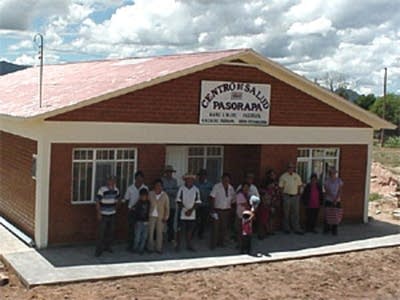Bolivians benefit from Minnesota's surplus medical goods

When the Velasquez' retired from their paying jobs, he from Northwest Airlines, she from Ramsey County, there was little question how they'd be spending their golden years. They became full-time volunteers in the organization they founded a dozen years ago.
Joan Valesquez says they collect new medical supplies including bandages, swabs, syringes and the like that for one reason or another are being discarded by hospitals and clinics.
"About 98 percent of what we take would be in a landfill in Minnesota if we hadn't taken it," she says.

Segundo Velasquez says they also scrounge big items that are perfectly useable, but in America's extravagantly wealthy -- some would say wasteful -- culture, are also headed for the trash heap.
Create a More Connected Minnesota
MPR News is your trusted resource for the news you need. With your support, MPR News brings accessible, courageous journalism and authentic conversation to everyone - free of paywalls and barriers. Your gift makes a difference.
"Crutches and walkers and wheelchairs, exam tables, and gurneys and beds," he says.
Lots of organizations in this country gather our discarded stuff of one sort or another and send it overseas. The Velasquez' public nonprofit organization, Mano a Mano, goes much further.
Segundo's brother Jose, a pediatrician in Bolivia, takes delivery of the donated goods and gets them to the clinics the organization is building.
"Mano a Mano is on its way to developing a bigger health care system in Bolivia than the government," says St. Paul health care consultant Patricia Ohmans, who has travelled to Bolivia and looked at what Mano a Mano does.

The medical goods collected here go to 72 health clinics in some of Bolivia's neediest villages and neighborhoods.
Ohmans says Bolivia ranks with Haiti as the poorest country in our hemisphere. The South American nation is about the size of three Montanas. There are deep jungles and high arid plains or altiplano, surrounded by towering snow-capped peaks.
The cities have Internet cafes and other appendages of our time, but, Ohmans says, often the roads out of town literally end at the outskirts.
Ohmans says along with Haiti, Bolivia has the hemisphere's highest death rate of infants and mothers.
"Babies die in droves. Water can't be drunk, food can't be found. There is nowhere in the United States where you see the kind of desolation that you see on the altiplano in Bolivia," Ohmans says.
If you're healthy you live. If you get sick, you just die.
Segundo Velasquez was born in rural Bolivia, one of eight children. Because there is almost no health care for many residents, Velasquez says the life or death equation is brutally simple.
"If you're healthy you live. If you get sick, you just die."
Joan Velasquez says in areas served by Mano a Mano built and supplied clinics, the equation has been dramatically changed. She says infant and maternal death rates have been brought down to nearly zero.
Mano a Mano and its donors contribute the $20,000 average cost of putting up the clinic buildings. Joan Velasquez says the residents help.
"They bring the water, they mix the cement, they hand things to the carpenters. We pay the carpenters. The government has to provide a salary for a nurse or a doctor from the very beginning," she says.
Velasquez says the organization's new venture is helping farmers build water impoundments so they can irrigate their crops to raise more food.

"Agronomists there say the farmers, once they have a water resevoir to draw water from during their dry season, will be able to increase their crop production probably by 300 percent," she says.
Most of Mano a Mano's $1 million annual budget comes from individual donors and foundations. Taxpayers help a bit through a federal government aid program and through a couple branches of the U.S. military that transport their medical supply containers.
The Velasquez' have moved out of their Mendota Heights home where Mano a Mano started, to a nearby condominium. The house is now headquarters for a small staff, and the attached garage is where the donated supplies are collected.
"Two or three times a week, volunteers will actually come over to sort," Segundo says.
Mano a Mano is expanding its work in Bolivia. Besides helping with economic development projects such as roads and water impoundments, the group wants to increase the number of clinics from 72 to more than 130 in the next four years.
